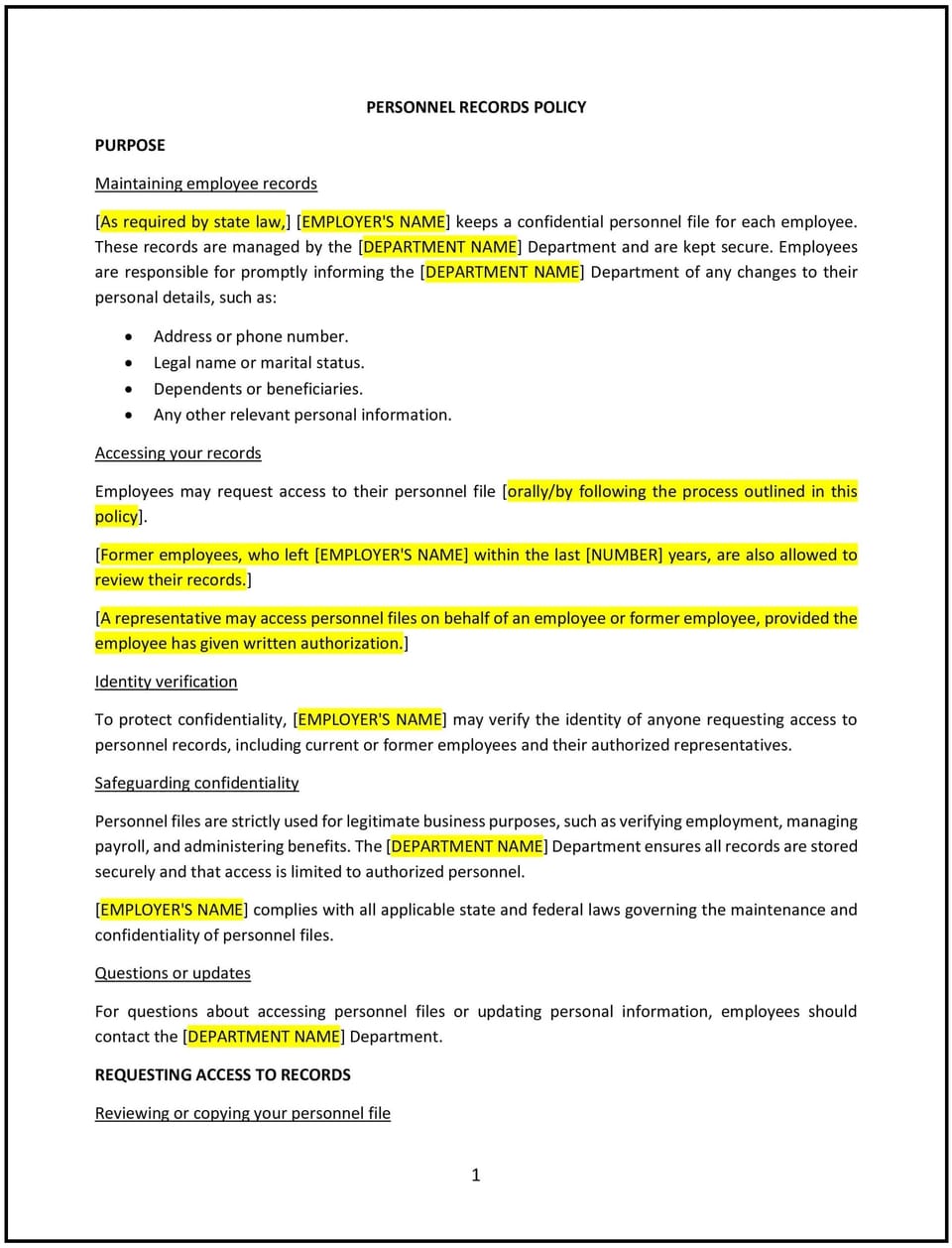Personnel records policy (Idaho): Free template

Personnel records policy (Idaho)
A personnel records policy helps Idaho businesses establish guidelines for maintaining, accessing, and protecting employee records. This policy outlines procedures for collecting, storing, and managing personnel records, including personal information, employment history, and performance evaluations. It also emphasizes the importance of confidentiality, accuracy, and compliance with applicable laws.
By implementing this policy, businesses can ensure the integrity of employee records, protect sensitive information, and maintain transparency in record-keeping practices.
How to use this personnel records policy (Idaho)
- Define personnel records: Specify the types of records included, such as employment applications, payroll information, performance reviews, and disciplinary actions, to ensure clarity.
- Establish collection procedures: Outline how personnel records will be collected, including the types of information gathered, consent requirements, and sources of data.
- Set storage and access guidelines: Provide guidelines for securely storing personnel records, including encryption, access controls, and retention periods, to prevent unauthorized access or loss.
- Address record updates: Explain the process for updating personnel records, including who is responsible for making changes and how accuracy will be maintained.
- Develop access protocols: Define who can access personnel records, under what circumstances, and the procedures for requesting and granting access.
- Train employees: Provide training for employees on how to handle personnel records, recognize potential threats, and follow the policy’s procedures.
- Review and update the policy: Periodically assess the policy’s effectiveness and make adjustments based on changes in technology, business needs, or Idaho laws.
Benefits of using this personnel records policy (Idaho)
This policy offers several advantages for Idaho businesses:
- Protects sensitive information: Clear guidelines help safeguard personnel records from unauthorized access, misuse, or breaches.
- Ensures accuracy: Structured procedures help maintain accurate and up-to-date personnel records, reducing the risk of errors or discrepancies.
- Promotes transparency: The policy fosters trust among employees by ensuring their records are handled fairly and confidentially.
- Reduces legal risks: The policy helps businesses adhere to record-keeping best practices and reduce the risk of legal disputes or penalties.
- Enhances operational efficiency: Clear guidelines streamline record-keeping processes, reducing administrative burdens and improving efficiency.
- Encourages accountability: Clear expectations and consequences help employees understand their responsibilities in handling personnel records.
Tips for using this personnel records policy (Idaho)
- Communicate the policy clearly: Share the policy with employees during onboarding and through internal communication channels to ensure awareness and understanding.
- Train employees: Provide training on record-keeping best practices, including how to handle personnel records, recognize threats, and follow the policy’s procedures.
- Monitor compliance: Regularly review record-keeping practices to ensure adherence to the policy and identify areas for improvement.
- Stay informed about legal updates: Keep up-to-date with changes to Idaho and federal record-keeping laws and update the policy as needed.
- Encourage transparency: Foster a culture where employees feel comfortable reporting potential issues or concerns related to personnel records.
- Document everything: Maintain records of data collection, storage, and access activities to ensure accountability and transparency.
Q: Why should Idaho businesses have a personnel records policy?
A: A personnel records policy provides clear guidelines for maintaining, accessing, and protecting employee records, ensuring accuracy, confidentiality, and compliance with applicable laws.
Q: What types of records should businesses include in personnel records?
A: Businesses should include employment applications, payroll information, performance reviews, disciplinary actions, and any other documents related to an employee’s tenure.
Q: How should businesses store personnel records securely?
A: Businesses should use encryption, access controls, and secure storage systems to protect personnel records from unauthorized access or loss.
Q: Who should have access to personnel records?
A: Access to personnel records should be limited to authorized personnel, such as HR staff or managers, and granted only for legitimate business purposes.
Q: How often should businesses update personnel records?
A: Businesses should update personnel records regularly to ensure accuracy, particularly when there are changes to an employee’s status, role, or personal information.
Q: What training should employees receive on handling personnel records?
A: Employees should receive training on how to handle personnel records, recognize potential threats, and follow the policy’s procedures for record-keeping.
Q: How often should businesses review their personnel records policy?
A: Businesses should review the policy annually or as needed to ensure it aligns with current technology, business needs, and Idaho laws.
This article contains general legal information and does not contain legal advice. Cobrief is not a law firm or a substitute for an attorney or law firm. The law is complex and changes often. For legal advice, please ask a lawyer.


